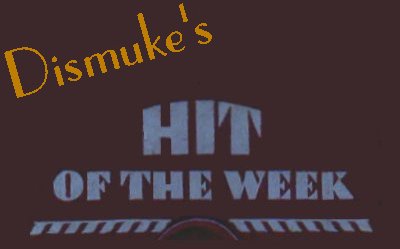

August 2001
August 30, 2001
Let's
Get Together 
The Home Towners
1929
(Romeo 932 mx 3750)
This strange but whimsically fun selection
definitely falls into the "novelty record" category. The command
at the beginning to "Let's go!" is somehow very appropriate and sets the
tone for everything that follows. I find the jazz solos featured
throughout to be especially interesting and enjoyable.
Unfortunately, I have not been able to find
any information about who The Home Towners were other than the fact that
they made several other records on the Romeo, Cameo and Banner labels.
(This particular recording was also released on Cameo 9130) My guess
is that the name was probably just a recording pseudonym and not an actual
group. If anyone out there knows for sure, I would be interested
in knowing - and if I receive it in time, I will include the information
with next week's update.
Note: Several people were kind enough
to write in and let me know that "The Home Towners," was a recording
pseudonym for Fred "Sugar" Hall and his Sugar Babies. The vocal on
the recording was by Arthur Fields.
August 23, 2001
I Can't
Give You Anything But Love 
Lou Gold and his Orchestra
1928
(Harmony 660-H)
This song - which is still occasionally
performed - comes from Lew Leslie's hit musical review "Blackbirds of 1928"
which featured an all-black cast and starred Adelaide Hall and Bill "Bogangles"
Robinson. The show premiered May 9, 1928 at New York's Liberty Theatre
and ran for 519 performances. Other famous tunes from the show included:
"Doin' The New Low Down," "Digga Digga Do" and "I Must Have That Man."
There were several successful all-black Broadway productions in the 1920s
- a decade that coincided with what is now referred to as the Harlem Renaissance.
Other than the song, however, this week's
selection has little else to do with the Harlem Renaissance. The
Lou Gold band was an all-white studio orchestra that cranked out popular
tunes under different pseudonyms for several companies. This
recording comes from an old Harmony Record. Harmony Records
are a frequent source of frustration for '20s era music fans as it
was the last American label to begin recording electrically. In 1923,
the Columbia Phonograph Company made a major investment in upgrading its
acoustical recording equipment to what was then state of the art.
Less than two years later, however, it was rendered obsolete by the advent
of electrical recording. Not wanting such recently acquired equipment
to go to waste, Columbia executives decided to continue using it for its
lower priced subsidiary labels such as Clarion, Diva, Velvet Tone and Harmony.
That is why this week's recording has a certain 'flat" sound to it.
It wasn't until 1930 that Harmony completely switched over to electrical
recording - long after the rest of the industry, including rival bargain
labels.
August 16, 2001
Calling 
Harry Reser, banjo
Bill Wirges, piano
1927
(Brunswick 3485-A)
While many consider Harry Reser to
have been one of the world's greatest banjo players , he is best remembered
for his dance band The Clicquot Club Eskimos which had one of the first
nationally sponsored radio programs over the then new NBC Red Network in
the mid 1920s. (Clicquot Club was a brand name for a line of soft drinks.)
In addition to its work in radio, Reser's band made hundreds of records
throughout the 1920s and early 1930s under dozens of pseudonyms including
The Jazz Pilots, The Six Jumping Jacks, The Campus Boys, The Rounders and
the Park Lane Orchestra.
Reser's peppy banjo solos were a fixture on
most of his band's recordings but they were usually quite brief.
This week's selection will provide visitors with an opportunity to hear
him perform at greater length. The pianist, Bill Wirges was a member
of Reser's band (The band even made some records under the pseudonym
of Bill Wirges and His Orchestra.) I particularly enjoy the musical "duel"
between banjo and piano halfway through the recording.
Harry Reser recordings previously
featured on this site include:
I've
Never Seen A Straight Banana
Harry Reser's Jazz Pilots
1927 (1920s & 1930s Section Volume I)
Where
The Shy Little Violets Grow
The Campus Boys 1928
(1920s & 1930s Section Volume IV)
Highways
Are Happy Ways
Harry Reser's Rounder's
1928 (1920s & 1930s Section Volume V)
August 9, 2001
Boo-Wa Boo-Wa 
Larry Clinton's Bluebird Orchestra
Jack Palmar, vocal
1940
(Bluebird B-10820-A)
When Larry Clinton formed his band
in 1937, he was already well known in the music business as an arranger
and the composer of successful songs such as "The Dipsey Doodle,"
and "A Study In Brown." Vocalist Bea Wain helped give the band several
of its biggest hits including "My Reverie," "Deep Purple" and "Heart and
Soul." While much of the band's output tended to be on the "sweet"
side, it also had its share of "swing" recordings as well as this week's
selection demonstrates.
"Bluebird" refers to Bluebird Records - RCA
Victor's lower priced subsidiary label.
August 2, 2001
If
I Had A Talking Picture of You 
Rodman Lewis, vocal
1929
(Domino 4456-A)
The words to this song sound very dated -
but that is part of its charm. Today, nobody refers to movies as
"talking pictures" and they are anything but a novelty.
Appropriately enough, it was in one of those
early talking pictures that the song was first introduced - the 1929 movie
musical Sunny Side Up which starred Janet Gaynor and Charles Farrell.
A number of other successful hits also came
out of the film including the title tune "Sunny Side Up" as well
as "I'm A Dreamer Aren't We All?" and "Turn On The Heat" Some
of these tunes can be heard elsewhere on this site.
This particular recording was made in 1929
but was not released until early 1930.

|

